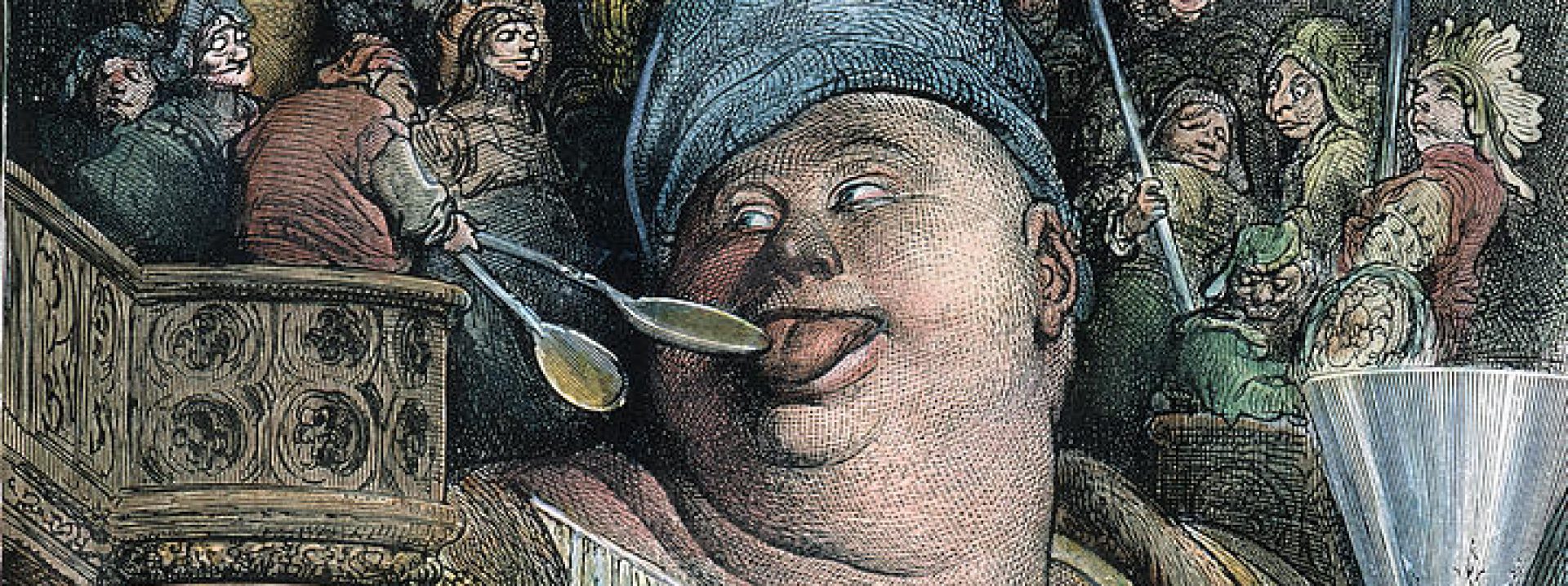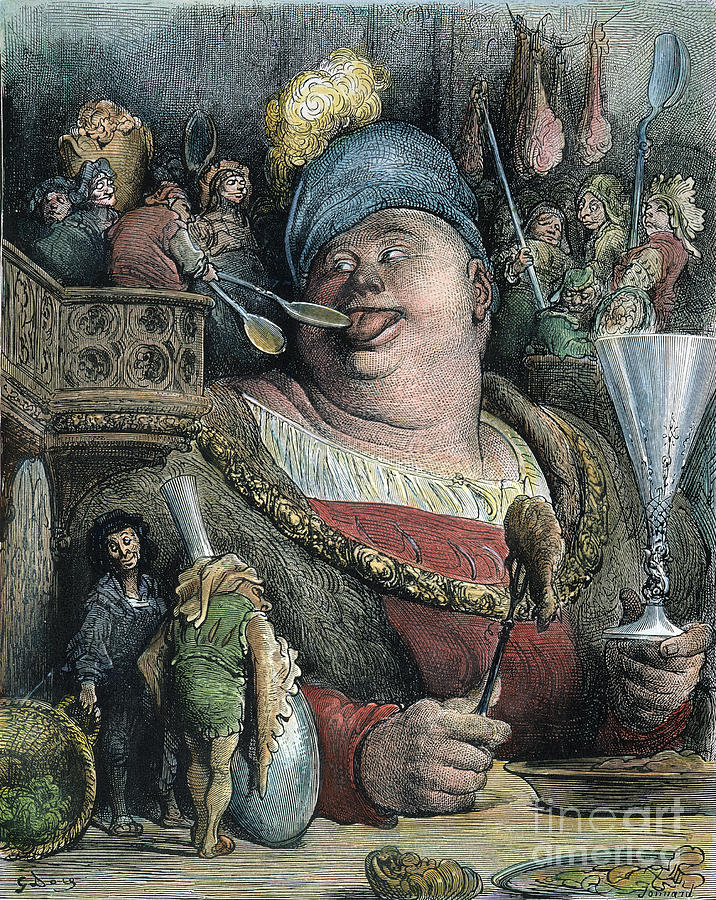Title: Bakhtin’s Rabelais and His World, p. 318.
Way back during the second week of class, we all sat within six feet of each other in the same room and it was unremarkable at the time. Specifically, we all sat within six feet of each other in the same room and watched clips from William Shakespeare’s Henry IV, focusing on the character of Falstaff.
I wanted to laugh along with the character as he partook in the false crowning we had come to identify as a quintessential element of the carnivalesque, but I found it more difficult than I had originally expected. And I didn’t quite know why.
As a fat person in the modern day (and as a fat person in this class) I couldn’t escape from the sinking feeling that Falstaff’s joy was embedded in a kind of degradation and mockery at the expense of his fatness. I’ve been thinking about this moment throughout the semester, and think this final project is an opportunity for me to re-engage with our materials from The Fat Studies Reader in order to teach myself a means of celebrating historical fat bodies for what they are, not for any sort of embodied representation of the carnivalesque.
I certainly understood a piece of the role of fatness in imagining the grotesque body – and that the grotesque body was to be celebrated – but struggled with the linkage between the two. I was projecting my own, twenty-first century relationship with fatness onto Bakhtin, and found only shame and guilt associated with fatness and overeating in assertions like “the grotesque face is actually reduced to the gaping mouth; the other features are only a frame encasing this wide-open bodily abyss.” (Rabelais and His World, 317).
For me, this claim rang with contemporary connotations of turning conversations around and behavior concerning eating to shaming fatness or evoking anxiety about – god forbid – becoming fat. But there’s a kind of power lurking behind this, and I read on:
“The grotesque body, as we have often stressed, is a body in the act of becoming. It is never finished, never completed; it is continually built, created, and builds and creates another body.” (37)
Whoa, okay. That’s pretty sick. By Bakhtin’s logic here, are not fat bodies the most powerful, the most grotesque of bodies? Is this not a sort of liberation from size anxiety? Our bodies are “continually built and created” and we build and create ourselves – there’s beauty in this shift. A change in the size of one’s body is an embodiment of this strength.
I hear echoes of this in Heather McAllister’s “Embodying Fat Liberation.” Writing that “fat liberation is [inherently] physical,” McAllister challenges the normativity of the idea that fatness and fat bodies are to be hidden:
“We will never have our freedom if we live only “from the neck up,” yet that is the way many fat people live, even, or especially, the activists and academics among us.” (Embodying Fat Liberation, 311)
This rings so strongly of Bakhtin’s notion of the material bodily lower stratum as something universal, yet something expected to be kept within the private sphere. There is a pervasive notion in our present day that fatness, as a source of shame, is something to be hidden. Anecdotally, plus-size clothing is often meant to “provide a slimming effect” or “flatter one’s figure,” a coded way of essentially saying the former.
All bodies are, in a way, expected to “live only from the neck up,” as McAllister writes. This is not meant to universalize the unique lived experiences of this phenomenon and its impact on fat bodies specifically, but Bakhtin would agree that the matters of the grotesque and of the lower stratum are meant to be visibly, audibly, and tactilely absent from everyday life. So too, is fatness.
Examining Elena Levy-Navarro’s “Fattening Queer History” helped me to apply the above logic to the character of Falstaff. Once I followed the author’s advice and opted to “see how figures [of the past] who are defiantly fat speak directly to the present in ways that can sustain us,” I found the solace and celebration I had been seeking (Fattening Queer History, 20).
Fatness is defiant. Falstaff’s fatness is defiant. Ultimately, this came to be how I imagined fatness in the classroom, which, yes, indisputably falls within the category of the grotesque, but I was previously unable to articulate how this was the case.
As the grotesque exists in opposition to the norm, so does fatness. As “we create communities based on an imagination that are as large and fat as any body,” (Levy-Navarro, 21), we also celebrate the grotesque body as “cosmic and universal” (Bakhtin, 318).
In literal size and in abstract implication, there is little more empowering than thinking of the fat body, Falstaff’s body, and my own body as cosmic. Fatness is, per the work of fat liberation theorists like McAllister and Levy-Navarro, to be celebrated on its own, but it is also to be celebrated as a pinnacle of Bakhtinian grotesqueness. After all, if the quintessential grotesque body is one that is, in its most pejorative articulation, an “abyss,” then the “cosmic and universal” fat body as an embodiment of this deserves to be held in particularly high regard: a symbol of defiance, abundance, and opposition.


Hi Allison,
Thank you for this final project. I remember after the first class, you and I talked about our apprehension about taking a class that classified fat bodies as “grotesque.” As our definition of grotesque evolved, I also had this moment of trying to reconcile fat bodies as empowered when society today classifies fat bodies as less than thin, fit, classically beautiful bodies.
I really love the contrast you’ve drawn between the pressure fat people feel to live “from the neck up” and Bakhtin’s view that fat bodies are “eternal” and “cosmic.” After reading your response, I am thinking about how when I reflect on my own body, if I gain weight, I feel like my body is not beautiful enough to deserve nice clothes or certain foods. I am wondering if this concept of having a cosmic, eternal body is better than having a “beautiful” body, or if the cosmic eternity is a form of beauty? Like, does Bakhtin think the Grotesque *is* beautiful, or is the Grotesque *superceding* beauty?
Allison, I didn’t want to stop reading! I’m so impressed at how well you were able to stitch together so many sources with a clean arc in a very personal narrative. I felt Harry in the pensieve for the first time, just following you through the semester, and like kinda confused about why I wasn’t in my room looking at my laptop anymore but also fully aware of everything that was going on around me.
As Juliana said, I think the questions you raise about in what manner the fat body is to be celebrated are really interesting. Your analysis makes it somewhat clear that the fat body is a very important part of the grotesque and something that should be celebrated, but how so is a really neat question and one I certainly don’t have an answer to.
Hi Allison! I really really enjoyed reading this piece. There’s something about it that just makes you want to keep reading and hearing more of your ideas. A few times I felt like I could actually hear you saying somethings you’ve written out loud as if I could hear you through my screen. This very personal narrative and your use of the grotesque to empower rather than degrade definitely made this an incredibly thought-provoking and impactful read.